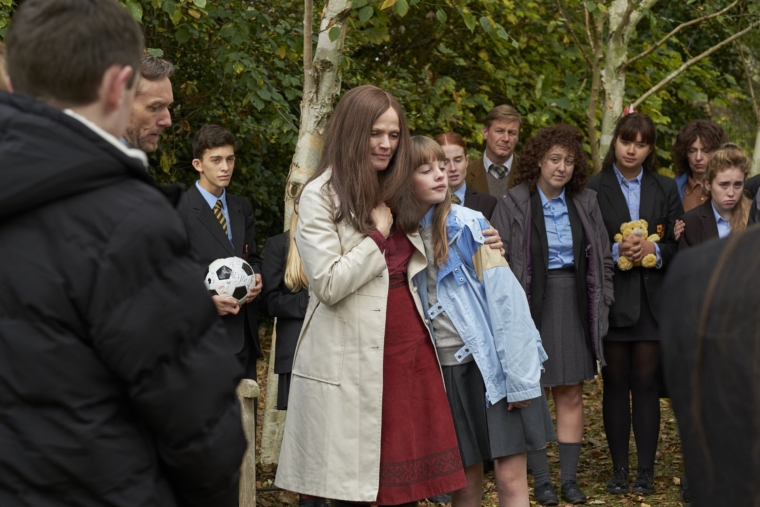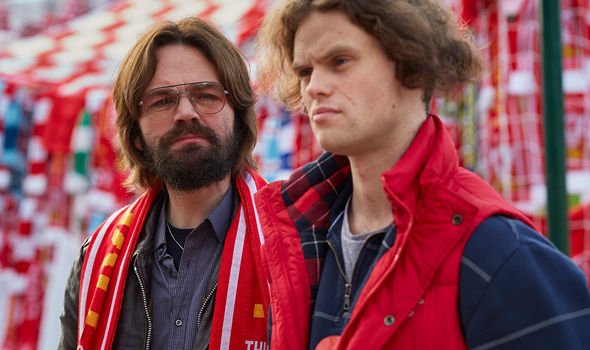Last night I watched the entire four-part series. I remember watching the live pictures on the day in 1989 and followed the story over the years but this series helped give new insights and revealed a lot more than I realised about the whole process. The length of the drama almost physically transmits the length of struggle that Anne continued up to her early death from cancer. Watching in one go you get a visceral sense of Anne’s transformation into a leader and her changing body as the cancer and the campaigning took its toll. Maxine Peake carries off a magnificent performance. You know she is totally committed to telling this story to a mass audience.

We sometimes talk about the relationship between the personal and political. This drama manages to perfectly capture both. It gives you all the facts your need to know about a national event involving the state, the government, the police, public opinion and particularly working people in Liverpool. At the same time it narrates the personal journey of a working class mum who became an author and a leader of a 30 year long struggle for justice.
On April 15 1989 there was as semi-final FA cup match between Liverpool and Nottingham Forest at Hillsborough stadium in Sheffield. Fans began to build up outside one of the entrances. Police took the decision to open another exit gate to release the pressure. This gate led to a narrow tunnel down to the terrace. Opening the gate meant thousands more were being herded into an already full area. They could have blocked the tunnel with stewards. It resulted in a huge crush. There was a near miss at goal, the fans surged forward and people started to be crushed to death. The final count has been 97 (96 on the day and another, years after as a direct result of their injuries).
Anne’s son, Kevin was among those who died. As Anne desperately tries to find out what happened to him on that evidence emerges that he died later than the time the coroner at the first inquest had determined as the ‘cut off ‘ time of 3.15. She hears from a police constable who gave him mouth to mouth resuscitation and a special constable who heard him speak well after that cut off time. This had huge implications because now not only was the police management of the crowd under the spotlight but also how it controlled the emergency response. The same contempt for fans the police said were drunk and rowdy meant they were worried about the security of the ambulance crews and so the ambulances stacked up outside were not called into the ground.
To cover up their role in the disaster the police immediately used a local press agency to push out stories about the drunkenness of rowdy fans. The Sun went further and said drunken fans were urinating on the police and pilfered from dead bodies. People in Liverpool reacted angrily to the Sun. The writers of the drama ensured that the viewer regularly sees the posters in Liverpool saying ‘don’ t buy the Sun’. Even today sales in Liverpool have never recovered.
Police put pressure on the police constable to modify his statement about Kevin convulsing on the makeshift stretcher to him merely twitching. The constable was submitted to a 6 hour interview with a senior officer to change his testimony. Later in the second inquest it emerged that police statements were ‘coordinated’ and civilian statements edited. A similar process allegedly took place by the same police force 5 years earlier in the aftermath of the Battle of Orgreave where police and miners clashed during the 82 miners strike.
There are claims of a freemason’s conspiracy among the Sheffield police officers to shift blame to one officer and to cover up. The second inquest from 2014-16 estimated that 41 of the 96 might have survived if the emergency response had been better.
Thanks to that tireless fight which was a a roller coaster of false hopes and establishment push backs some partial justice was secured when the second inquest in 2016 returned a verdict of unlawful killing. However in 2019, David Duckfield, the officer in charge on the day, was found not guilty of any responsibility in that unlawful killing. Apparently in our justice system there can be an unlawful killing but nobody is held responsible.
There is a pattern here. Whether it is other tragedies like the coal slurry disaster which buried the primary school in Aberfan or the hundred and forty odd still killed every year in workplace accidents, it is very, very rare that anybody pays a price. Certainly prison is never usually applied and at best there are fines. Working class lives are cheap.
Right through the drama interweaves the public domain and Anne’s personal story. It shows how both the tragedy itself and the cover up had a massive impact on people’s daily lives. Anne’s marriage breaks up as her partner finds it too emotionally draining to follow his wife’s relentless campaigning. Other survivors suffer mental illness and even suicide. Anne herself does not take enough care of her own health due to her focus on the campaign and her cancer is diagnosed too late. Her daughter at this point says, ‘mum it is killing you’. Anne retorts: ‘no it is keeping me alive’. Despite all the anguish this struggle has given meaning to her life and expresses her love for her son.

Shamefully the national labour party collaborated in the inaction and cover up. Eventually Andy Burnham, the MP, attends an anniversary event. His speech is interrupted by the crowd chanting the slogan Justice for the 96. Visually moved he is stung into action promising to take the issue to the shadow cabinet. A few years later after Blair is elected in 97 this leads to another judge led inquiry to reassess the evidence. The drama brilliant captures the class gulf between the Liverpool campaigners and this rather patrician senior judge. When Jack Straw, the Home Secretary, sees the report he decides there is no case for further action.
Lots of questions are raised here about Labour that the drama could not easily deal with. Why was this particular judge chosen, why not choose someone who would be more sympathetic? Surely friendly Labour lawyers could suggested an alternative? Why was Blair so lukewarm? We can only speculate. Remember this was New Labour trying to throw off too narrow an affiliation with the traditional working class and militant labour movement. Liverpool conjured up precisely that image and was seen as a militant area. Blair was reaching out to the middle class, to Ford Mondeo man and wanted to emphasise it classless, one nation politics. Tough on crime and its causes was a slogan which in reality focussed on the first party. More police and plenty of anti-social behaviour orders were the key agenda. Unlike the suburbs and Home Counties Liverpool was not a key electoral battleground for New Labour, it was a base that could be ignored, they would not vote Tory. If Blair had stood full-square behind these Liverpool fans maybe some of those false stories about drunken, rowdy fans would tarnish the sparkling new Labour brand.
The campaign had to revitalise its work, reaching out nationally with petitions and an inquiry led by the Bishop of Liverpool and Phil Scraton a specialist academic. The inquiry effectively undermined the basis of the first inquest. Why Labour could not have organised the same thing a few years earlier is difficult to understand. Paradoxically in this way the campaign managed to get Cameron, a Tory prime minister, to actually apologise in parliament for how they had been treated and to set up a new inquest. The new inquest was set up and the unlawful killing judgement made.
Anne’s story vividly contrasts the potential of working class self organisation with the failure of the Labour party. The drama shows the activists welcoming the end of the Tory government, they identify with Labour. We see their anger later with the Jack Straw decision not to proceed. We saw the same contrast between Kinnock, the Labour leader, refusing to concretely support the miners in the big strike of 1984 and the mobilisation of the NUM and the mining communities. It is no surprise that eventually some of these communities are now voting Tory.
Women like Anne played a major role in building solidarity with the miners. For socialists it shows that we need a different sort of party that challenges the establishment and the capitalist class. Will the ongoing inquiry into the disastrous fire of the Grenfell tower lead to any sort of justice? Mostly workers and people of colour were killed as a result of the negligence of the builders and class bias of Kensington and Chelsea council. Will people be held accountable, be fined or face imprisonment?
Don’t hold your breath, remember Hillsborough.
Anne can be found on the ITV hub.
Art Book Review Books Campism Capitalism China Climate Emergency Conservative Government Conservative Party COVID-19 Creeping Fascism Economics EcoSocialism Elections Europe Far-Right Fascism Film Film Review Fourth International France Gaza History Imperialism Iran Israel Italy Keir Starmer Labour Party Long Read Marxism Marxist Theory Migrants Palestine pandemic Protest Review Russia Solidarity Statement Trade Unionism Ukraine United States of America War Women

